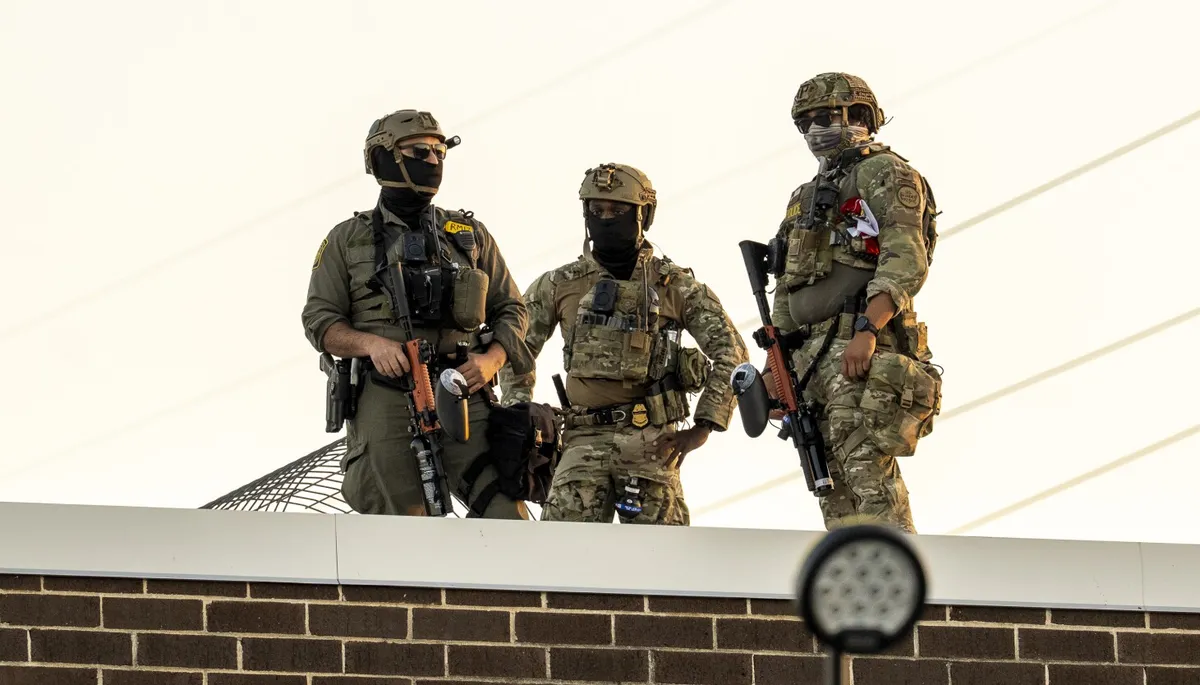
In a significant development regarding immigration enforcement in Illinois, Governor JB Pritzker announced on Monday that the Department of Homeland Security (DHS) is seeking to deploy 100 military troops to the state. This move, aimed at providing "protection for ICE personnel and facilities," comes after a month of threats from former President Donald Trump. Pritzker made this announcement during a press conference, flanked by key local officials including Mayor Brandon Johnson, Attorney General Kwame Raoul, and Cook County Board President Toni Preckwinkle.
Governor Pritzker's remarks were sparked by recent reports of border patrol agents patrolling downtown Chicago armed with guns, as well as arrests occurring outside the U.S. Immigration and Customs Enforcement (ICE) detention facility located in Broadview, a suburb of Chicago. Pritzker has stated that the Illinois National Guard has obtained a memo from the DHS requesting military personnel for the state, although details on the type of troops and the timeline for deployment remain unclear.
Drawing parallels to a similar memo sent to Oregon's governor, which authorized 200 members of the Oregon National Guard for a 60-day deployment, Pritzker expressed his concerns about the implications of such military actions. "What I have been warning of is now being realized," he stated. "One thing is clear: None of what President Trump is doing is making Illinois safer."
The governor's office is actively preparing for the potential arrival of military troops. Christian Mitchell, Pritzker's running mate and former deputy governor, is an active member of the Illinois National Guard. Pritzker emphasized that the federal government is claiming a need to protect ICE personnel and facilities, though it remains unclear what specific events prompted this directive.
Recent unrest surrounding the Broadview facility included two individuals charged with assaulting federal officers during protests, raising questions about the nature of the threats that have led to this military request. Additionally, an investigation has been launched by Broadview police after a CBS News reporter reported an alleged unprovoked attack on her vehicle by a federal agent.
Protests against ICE operations have intensified since the Trump administration's announcement of "Operation Midway Blitz" on September 8. This operation has resulted in a significant increase in federal immigration officers conducting raids and arrests in the Chicago area. Pritzker criticized the federal response to peaceful protests, which have often been met with aggressive tactics such as tear gas and rubber bullets. "In Broadview, people non-violently holding signs have been regularly attacked with chemical agents," he said.
Pritzker has called for Chicago residents to document any interactions with ICE agents, urging them to share their experiences on social media. "With one voice, we are telling this unwarranted and unconstitutional occupation by ICE and potentially by military troops to get out of Chicago," he declared.
Both Pritzker and Mayor Johnson have denounced the armed presence of federal agents in the city as a political maneuver rather than a genuine public safety concern. Johnson described the deployment as a "stunt" aimed at advancing political goals. "What we saw yesterday was an absolute disgrace," he added, emphasizing the need to resist the militarization of urban communities.
While Pritzker and Raoul acknowledged that the current memo does not provide sufficient grounds for a legal challenge, they hinted at potential future actions. Raoul stated that Illinois would file a lawsuit against the Trump administration if evidence supports the need for legal action, similar to a lawsuit already filed by Oregon against the federal government.
Ed Yohnka, spokesperson for the American Civil Liberties Union of Illinois, raised concerns about the lack of clarity surrounding the deployment of military troops. "There is no emergency that justifies sending additional force into Chicago," he asserted, reinforcing the legal prohibition against utilizing military personnel for routine policing activities.
As the situation unfolds, it remains to be seen how the deployment of military troops will impact the local communities and the ongoing discourse surrounding immigration enforcement in Illinois. Governor Pritzker's administration is actively monitoring the developments and preparing to respond accordingly.